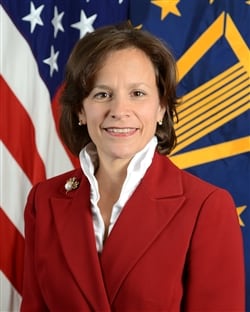Military OneSource will offer peer support for troops and family members beginning this summer, expanding the military community's options for confidential assistance.
The move comes as DoD has decided not to renew the contract for the Vets4Warriors program, which has provided peer-to-peer support for veterans, service members and families since December 2011.
Vets4Warriors has connected callers to people who have walked paths similar to theirs, as part of helping them find resources for support.
Some New Jersey lawmakers have asked Defense Secretary Ash Carter to reconsider the decision on Vets4Warriors, operated by Rutgers University Behavioral Health Care through a call center with about 40 employees in Piscataway, N.J.
"We are concerned that by integrating these efforts into the Defense Department's Military OneSource program, the trust in the confidential assistance provided by an organization like Vets4Warriors will be lost," wrote the lawmakers in a May 20 letter to Carter.
"Decreasing the number of options available to our service members struggling with mental health concerns seems irresponsible and an unconscionable shirking of our responsibility to service members and their families."
The effort was led by Rep. Bill Pascrell Jr., D-N.J., who signed the letter, as well as New Jersey Sens. Cory Booker and Robert Menendez and Rep. Frank Pallone Jr., also Democrats, and Reps. Frank LoBiondo and Tom MacArthur, Republicans.
Defense officials contend they are not cutting services, but expanding them. "We are widening the network of care, not narrowing it," said Rosemary Freitas Williams, deputy assistant secretary of defense for military community and family policy.

"We are widening the network of care, not narrowing it," said Rosemary Freitas Williams, deputy assistant secretary of defense for military community and family policy.
Photo Credit: Defense Department
Military OneSource, provided through a contract, also is confidential, noted Williams, whose office oversees that program.
The Vets4Warriors program, provided by contract through the DoD Suicide Prevention Office, has cost DoD about $5.5 million a year.
But cost savings did not drive the decision, said DoD spokeswoman Laura Seal.
"What drives our decision making is a steadfast commitment to providing service members and families with the best possible benefits and assistance, which is what expansion of Military OneSource to include peer-to-peer support enables us to do," Seal said.
Vets4Warriors officials referred questions to the Defense Department. Information was not immediately available about whether Vets4Warriors may continue with outside funding.
DoD is developing a transition plan to ensure continuity of care for active cases, call forwarding, website queries, email and social media transfers to Military OneSource. Williams said DoD experts have had discussions with Vets4Warriors officials about lessons learned.
DoD plans to start offering peer-to-peer support by June 15, Williams said. Such support through Vets4Warriors ends when that contract expires Aug. 15.

There is no need to add staff members for the peer support expansion, because a number of the consultants are military spouses, military parents, retirees or veterans, Williams said. Even so, these master's degree-level consultants will get additional training in peer-to-peer support, she said.
Peer support has always been an informal part of the military community. "Military spouses have always been a tight community," offering each other support, she said, but now the effectiveness of such support has been documented.
"The exciting thing is, it's evidence-based. We know it works," she said.
The New Jersey lawmakers said the Vets4Warriors program has had more than "130,000 contacts" with service members and their families since its launch in December 2011. As part of the program, the trained peers also follow up with troops, veterans and family members to make sure their needs are met after the initial call.
Williams said Military OneSource has about 900,000 contacts each year and also follows up with service members and families.
Unlike Vets4Warriors, Military OneSource assistance is available only to retirees, veterans and their families within 180 days after leaving the service. "But no one gets turned away," Williams said. "We do get veterans who are not eligible for Military OneSource to the right place."
Consultants do a "warm hand-off" to ensure veterans are connected to the resources that can best help them, she said, noting that the VA has a number of resources, including call centers and peer support, related to mental health.
One such VA resources is Vet Centers. "They were peer-to-peer before it was cool," she said.
Callers to Military OneSource can be connected to consultants — all of whom have at least a master's degree in psychology or a social science field and can address a variety of needs in one call. The consultations can be done by telephone, through the Web, face-to-face or by video.
People rarely call for one issue or need, Williams said. For example, a military spouse experiencing anxiety might call to find out about a wellness program. While on the phone, the consultant might learn there is a special-needs child in the family, and checks to make sure the spouse is aware of help available through the Exceptional Family Member program.
"We want to make sure all their needs are taken care of," Williams said. "Connections help keep people safe," and the peer-to-peer support will provide another way to connect.
"This is a decision about providing the best possible benefit to service members, their families and their survivors."
Karen has covered military families, quality of life and consumer issues for Military Times for more than 30 years, and is co-author of a chapter on media coverage of military families in the book "A Battle Plan for Supporting Military Families." She previously worked for newspapers in Guam, Norfolk, Jacksonville, Fla., and Athens, Ga.




